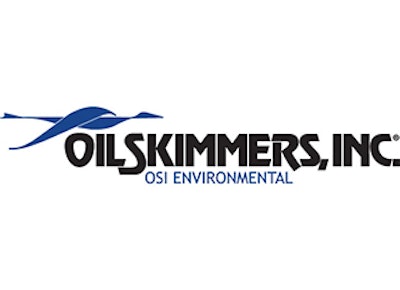
Skim Oil Early
to Improve Your
Process and
Your Profits
W H I T E P A P E R
Early removal of oil from your
facility’s wastewater can improve
operational efficiencies, generate
revenue, demonstrate environ-
mental responsibility and even
promote employee health.
oilskim.com © Copyright 2014, Oil Skimmers, Inc. All Rights Reserved. 1
Today’s manufacturing and industrial processing facilities face intense competitive pressures, challenging economic
conditions and stringent government regulations. To thrive, companies must engage in operational “best practices”
designed to continuously improve process and product quality and reduce costs. An often overlooked method of
process improvement is to remove oil from your facility’s wastewater or process stream as soon as possible, prefer-
ably using a highly cost effective “tube type” oil skimmer. Properly applying a tube type skimmer can pay for itself
within a few months by improving operational efficiencies, promoting employee and environmental wellness and
generating new revenue.
Why Should You Remove Oil Earlier?
The earlier you remove oil, grease and fats from your
wastewater stream, the more advantageous it can be
to your operation. “Earlier” means as close as possible
to the point of discharge or origin, where oil enters the
wastewater stream. As oil moves downstream in the
process, it can clog machinery, blind filters and add
complexity and cost to the wastewater treatment
process. In addition, the oil may itself degrade to
the point that it loses its value either for recycling
and reuse in the facility or to oil recyclers.
In general there are four benefits to removing
oil early in the process
Improves operational efficiencies
Early removal of oil provides numerous
opportunities to improve your operational
efficiencies. From extending the life of process water
and coolant to reducing costs of the chemicals used
to treat wastewater and those associated with disposing
of coolant, you can quickly reap the benefits of removing
oil further upstream.
Generates revenue
The sooner oil is removed from the wastewater
stream, the purer it is and the greater its value;
the oil has better potential to be re-used in your own
facility, and in addition, it has greater value to other
industries and to oil recyclers.
Supports environmental responsibility
There is growing public awareness of the im-
portance of commitment to environmental
responsibility. Increasingly, companies are pro actively
choosing to make the best use of our planet’s limited
resources, employing cleaner operations and reducing
pollutants. Early removal of oil saves water, reduces the
use of other water treatment chemicals and enhances the
ability to reuse and/or recycle oil. In all it represents an
important commitment to environmental responsibility.
Provide a safer, healthier work environment
for employees
When left to linger in wastewater, oil can trap
anaerobic bacteria in the water. The growth of the bac-
teria can result in foul odors and may lead to skin disor-
ders. Removing the oil early diminishes the opportunity
for the bacteria to grow and become a health hazard.
1
2
3
4
W H I T E P A P E R Skim Oil Early to Improve Your Process and Your Profits
oilskim.com 2
When it comes to process water
there are several benefits to
removing oil early:
Increases the lifespan
of process water
Reusing process water reduces a
facility’s intake of fresh water which
saves money and increases efficient
use of increasingly scarce fresh water
resources. For example, an automo-
tive forging supplier uses fresh water
to wash the ends of hot-rolled bars
and to cool dies while oil is used
to lubricate the forging equipment.
Throughout this process, the excess
water and oil are collected in a pit
below the machines. An oil removal
system using an ultra efficient tube
type oil skimmer extracts the oil
from the cooling water continuous-
ly so that the water can be reused
during the manufacturing process.
Increases the lifespan
of process oil
In addition to reusing process water
in your facility, early oil removal
enables you to reuse the oil as well.
Once oil has been used, if it can be
collected efficiently it can be recy-
cled and used over and over again.
According to the Environmental
Protection Agency (EPA), an esti-
mated 380 million gallons of used
oil are recycled each year. Recycled
used oil may be used again for the
same job or it may be reconditioned
and used in a completely different
manner. When oil is reconditioned
on site, any impurities are removed
from the oil and it is ready to be used
again. In the automotive forging ex-
ample, the oil recovery system works
unattended 24/7, removing as much
as 100 gallons of waste oil per hour
and decanting it into a drum. The
recovered oil is virtually water-free.
The cost savings of reusing the oil are
significant as are the environmental
benefits.
Extends the life of coolant
Another benefit of removing oil
early in the manufacturing process
is the ability to extend the life of
coolant. “Tramp oils” – hydraulic
oil, lubricating oil and greases, and
protective metal coatings get mixed
with coolants used in machining
operations and create expensive and
frustrating problems. For example,
when tramp oils combine with other
contaminants in coolant they can
form a sticky substance that can clog
lines and spray nozzles. When the
oils mixed in with the coolant come
into contact with the tool, the cool-
ing effect of the coolant is reduced,
causing shorter tool life, product
staining, inaccurate tolerances and
a smoky atmosphere in the plant.
Discussions with machine tool
manufacturers, coolant suppliers
and plant personnel indicate that
keeping tramp oil from seeping
into coolant is virtually impossible
because the oil is typically a neces-
sary component in lubricating and
preserving the efficiency of mechan-
ical rotating equipment. In addition,
there can be there can be leaks from
equipment or a one-time occurrence,
such as a hydraulic line break. Since
it is extremely difficult and cost
prohibitive to prevent all oil from
entering the coolant, the best solu-
tion is to be prepared to continuous-
ly remove tramp oil from the coolant
stream.
Over the years, the need to keep
coolants clean and extend their life
has become an even greater issue
because:
The cost of coolant
replacement has increased
The cost of labor associated
with coolant replacement
has increased
Tolerances have become
more critical and rejects
less acceptable
Employers and employees
are more concerned about
healthy working conditions
and plant environment
Disposal of spent coolant
is more expensive
Focus on Process Water
Process water is the water used in industry for machining, cooling or other activities where water comes in contact
with any raw material, product, by-product or waste during a production or industrial process.
© Copyright 2014, Oil Skimmers, Inc. All Rights Reserved.
W H I T E P A P E R Skim Oil Early to Improve Your Process and Your Profits
oilskim.com 3
Reduces cost of disposing
of coolant
In addition to reusing coolant water
and extending the life of the coolant,
early oil removal also minimizes the
costs associated with disposing of the
coolant. There are two basic methods
of coolant disposal:
Break down the coolant,
discharge the water and
dispose of the concentrate
Haul away the entire
coolant mixture
Ultra filtration and distillation are
the most common ways to break
down the coolant mixture. Each
method works better if floating
oil in the mixture is first removed.
When free oil is eliminated from
the coolant, the distillation process
requires less energy and ultra
filtration efficiency can increase
from 20% to 70%.
Certain coolants can be discharged
into municipal sanitary sewers if
they are free of tramp oil. Waste
haulers typically charge more if
the tramp oil has not been removed
from the mixture. Some will not
even take coolant mixed with tramp
oil. The solution to this problem
is to remove the tramp oil, then
dispose of it. Once removed from
the coolant, some plants mix tramp
oil with their plant fuel oil and burn
it, others sell it to waste oil proces-
sors and recyclers.
Improves production
process efficiencies
A metal office furniture manufacturer
washes parts during the production
process to remove protective coatings
applied by the steel manufacturer
and to ensure proper adhesion of
paint. The lubricants used on dies
and equipment are washed off the
parts as well. As these lubricants
and oils accumulate on the surface
of the parts washer solution, they
leave a film that clings to metal
surfaces of the part being washed
so paint will not adhere properly
or, at a minimum, the part will
need to be cleaned again. Removal
of oils and lubricants in the parts
washer (i.e. at the point of origin)
using a tube type skimmer results in
oil-free parts, properly prepared for
maximum paint quality while reduc-
ing the need for costly chemicals and
frequent wash water recharging
to break up the oil.
Another example of production
process efficiencies involves a food
processor that produces 2 million
pounds of pizza toppings per week.
After cooking, the meat toppings are
flash-frozen in spiral freezers. The
company uses 1,600 gallons of water
per hour to defrost the freezer coils.
Each defrost cycle carries about 50
pounds of grease with the water,
causing an overloaded and clogged
dissolved air flotation (DAF) system
and a maintenance problem for the
company. By redirecting the defrost
water to a discharge system and
removing the oil there, the company
no longer experiences shutdowns
due to drain backups; they have
improved the quality of their effluent.
Focus on Process Water - Continued
© Copyright 2014, Oil Skimmers, Inc. All Rights Reserved.
W H I T E P A P E R Skim Oil Early to Improve Your Process and Your Profits
oilskim.com 4
Improves treatment
system efficiency
Removing oil “upstream,” or as the
first step, prior to treatment can
improve the efficiency of the treat-
ment system itself by extending the
life of filters, probes and sensors. Oil
droplets that have the opportunity to
linger in the wastewater stream can
become too large to pass through
filters efficiently. When a filter is
clogged or blinded by oil, it not only
requires more frequent filter chang-
es, but it can send inaccurate signals
to the system indicating a new filter
is required. This can halt the process
and incur costs of downtime, main-
tenance and filter replacement.
Removing oil from your wastewater
before it reaches a filtration system
reduces the opportunity for oil to
clog or blind filters. It increases up
time and improves the efficiency of
the filtration system and allows the
filter to perform better in its role of
extracting other contaminants. The
same is true for sensitive monitoring
equipment that may become coated
with oil. Early removal of oil from
wastewater prevents oil coating and
helps preserve the life of probes and
sensors.
Reduces costs within the
wastewater treatment process
Oil that reaches your wastewater
treatment system may require the
use of additional chemicals and
processes to remove it. Coagulants,
polymers, vacuums and absorption
materials may be needed to remove
the oil at that stage of the treatment
system. When oil is removed from
the water before it reaches the waste-
water treatment system, the cost of
these products and the time required
to integrate them into the system can
be reduced or eliminated.
In one typical “real life” example,
a food processor realized a signif-
icant boost to their bottom line by
removing oil prior to the treatment
process. Large slugs of oil were
causing problems in the company’s
wastewater treatment system. To try
to alleviate the problem, wastewater
treatment plant operators added
more alum to treat the oil slugs, but
this actually caused more sludge.
Also, the oil clogged up the system
reducing efficiency and requiring
additional maintenance. When an
increase in production compounded
the oil-related complications, the
food processor decided to remove
the oil from the wastewater before
it entered the lift stations, thus elim-
inating the cost of additional chemi-
cals and unscheduled maintenance.
Focus on Wastewater
Once process water becomes adversely affected by industrial processes within a facility and is no longer useful,
it becomes wastewater. To comply with government regulations, facilities use various methods of processing
wastewater for disposal. We believe there are at least several clear benefits from removing oil early in the
wastewater treatment process:
Focus on Waste Oil Recycling - An Unexpected Source of Revenue
In addition to creating new opportunities for cost reduction and efficiency, the waste oil collected can itself become a
new source of revenue. As oil travels with water through the waste stream it may come in contact with other chemi-
cals, surfactants and detergents that break down and contaminate the oil. This is known as “chemical emulsification.”
Oil may also encounter mechanical emulsification. This occurs when oil and water travel through a pump or splash
into a tank. In either case, the oil droplets become smaller and more difficult to collect. Oftentimes, oil removed at
this late stage is too contaminated with chemicals or water to have any residual value. When oil is removed earlier,
closer to the point of origin, it has less opportunity to emulsify chemically or mechanically and is easier to collect.
This helps retain the value of the oil enabling it to be reused or recycled.
© Copyright 2014, Oil Skimmers, Inc. All Rights Reserved.
W H I T E P A P E R Skim Oil Early to Improve Your Process and Your Profits
oilskim.com 5
Focus on Waste Oil Recycling - Continued
Industries that produce biodiesel, soap or animal feed may be viable prospects for spent oil. For example, a potato
chip manufacturer began skimming oil from its wastewater stream to improve the efficiency of its water treatment
equipment. As an added benefit, the manufacturer found a market for the discarded oil selling it to companies
that make bio-fuels and generating revenue while keeping about 8,000 gallons of discarded oil out of landfills each
month.
In summary, waste oil can also be recycled and cleaned, and receive additives to help make into it essentially new oil.
When oil is sold to recyclers, they are able to sell it to other businesses that use it for:
Industrial burner oil
Mold oil to help release products
from their molds
Hydraulic oil
Bitumen-based products
An additive in manufactured products
Re-refined base oil for use as a lubricant,
or hydraulic or transformer oil
Focus on the Environment and Employee Health and Safety
In addition to creating cost savings, improving efficiencies, and generating a new source of revenue, there are
environmental benefits to removing of oil early from your wastewater. According to the United States Environmental
Protection Agency (EPA), re-refining used oil takes only about one-third the energy of refining new crude oil to
create lubricant quality oil. They also state, producing 2½ quarts of high-quality lubricating oil takes 42 gallons
of crude oil, but only one gallon of used oil.
Likewise, when you are able to re-use the process water, coolant and oil because you have taken care to skim the
oil upstream, you are conserving valuable resources. Some cities
and states offer tax incentives, rebates and other economic
advantages for companies that engage
in water conservation activities.
Finally, when oil is left to linger in process water
or wastewater, the oil traps bacteria and the bacteria
can grow, leading to foul odors and potential skin
irritants to employees. Removing oil early in the
process keeps it from trapping bacteria in the
wastewater and helps ensure a cleaner, safer
work environment.
© Copyright 2014, Oil Skimmers, Inc. All Rights Reserved.
W H I T E P A P E R Skim Oil Early to Improve Your Process and Your Profits
oilskim.com 6© Copyright 2014, Oil Skimmers, Inc. All Rights Reserved.
Includes water that has been
discharged to the city/municipal-
ity from residents, businesses,
industry, rain, sewers, etc.
Water that has been used in
an industrial process for mfg,
cooling, washing, etc. that has
combined with contaminants
(chemicals, solids, oil, grease,
fat, etc.)
Chemical(s) introduced into the
wastewater in order to alter its
make-up (pH levels, react with
existing chemicals, etc.) before
entering filtration process or
as a means to prepare for
discharge to municipality.
Wastewater enters a filtration
process where certain solids
(debris, metal chips, etc.) and/
or chemicals are filtered out of
waste stream.
Skim oil
before re-useWater that is treated, filtered,
purified, etc. for general use,
drinking, tap, etc.
THE JOURNEY OF WATER - OPPORTUNITIES TO REMOVE OIL
GENERAL USE / CLEAN WATER
MUNICIPAL WASTEWATER
FILTRATION
FILTRATION
INDUSTRIAL WASTEWATER
CHEMICAL TREATMENT
DISCHARGE NOW OR TREAT FURTHER
BEFORE DISCHARGING OR RE-USING?
IN EITHER CASE, THE WATER MUST
BE CLEANED
Skim oil before
chemical treatment
Skim oil before
filtration
Water used during a process
(mfg, cooling, etc.) that has not
yet entered the waste stream
and sometimes is re-used before
releasing into waste stream
IN-USE / PROCESS WATER
Skim oil before
discharging to
municipality
The OSI icon denotes opportunities
to skim oil throughout the
wastewater treatment process
USED / WASTEWATER
W H I T E P A P E R Skim Oil Early to Improve Your Process and Your Profits
oilskim.com 7
Skim Oil Early to Improve Your Process
and Your Profits
Removing oil earlier in the wastewater stream
is critical to maximizing operational efficiencies,
avoiding unnecessary costs and generating new
revenue opportunities. Tube oil skimmers offer
the greatest flexibility and effectiveness when
integrating this function into your
existing work flow.
Choose the right partner for the job
and you will be realizing a rapid ROI
and new benefits that will drop right
to the bottom line.
1-800-200-4603 | oilskim.com
TO IMPROVE YOUR PROCESS AND YOUR PROFITS.
© Copyright 2014, Oil Skimmers, Inc. All Rights Reserved.



















